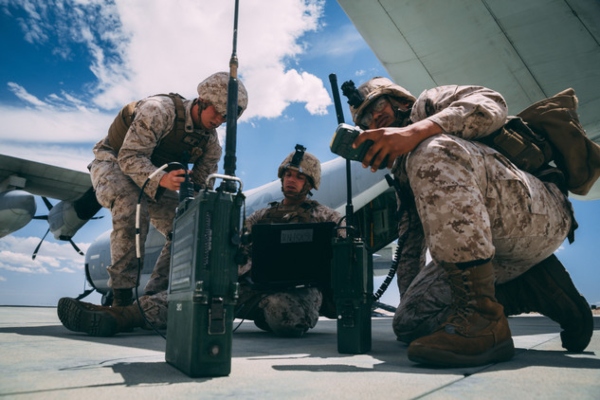USMC 63 Field Avionics/Electrical Systems is a department of the Marine Corps related to aviation jobs.
The Marine Corps assigns every soldier a job, or Military Occupational Specialty (MOS).
Military Occupational Specialties are grouped together in occupational fields, or OccFlds.
USMC 63 Field is an ideal occupational grouping for soldiers interested in avionics and electrical systems.
Related Article – USMC Field 60 (Aircraft Maintenance/Mechanic): Career Details
Jump To An MOS
| 6312 - 6332 | 6333 - 6386 |
|---|---|
| MOS 6312 MOS 6313 MOS 6314 MOS 6332 | MOS 6333 MOS 6336 MOS 6337 MOS 6386 |
Purpose of USMC 63 Field
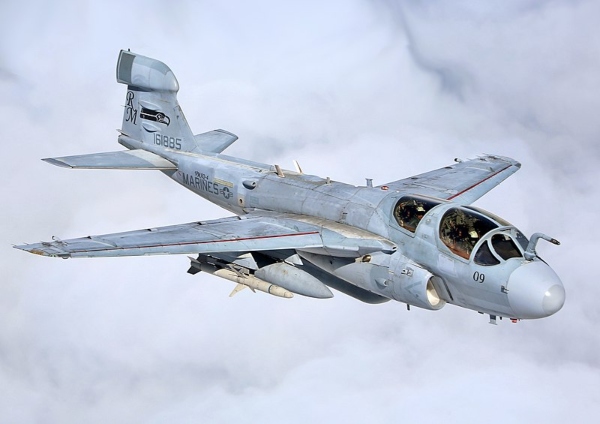
Marine Corps 63 Field provides direct and indirect support of all aviation weapon systems.
Field 63 Marines accomplish organizational maintenance activities (OMA) on aircraft as well as intermediate maintenance activities (IMA).
Soldiers entering USMC 63 Field begin basic training with the Marines before progressing to advanced training specific to the MOS.
Marines maintain and repair avionics while also getting assigned administrative tasks.
OccFld 63 workers can eventually progress to supervisory positions after putting in time and improving rank.
USMC 63 Field Avionics/Electrical Systems is one branch of the Marine Corps aviation department in addition to Field 60-62.
Marine Corps OccFld 60 provides general aircraft maintenance while OccFld 61 (Helicopters) and OccFld 62 (Fixed Wing Aircraft) focuses on specific types of aircraft.
Let’s take a look at the various MOS offered under USMC 63 Field…
Related Article – Marine Corps Electrician (MOS 1141): Career Details
Aircraft Communications/Navigations/Radar Systems Technicians (MOS 6312-6313)
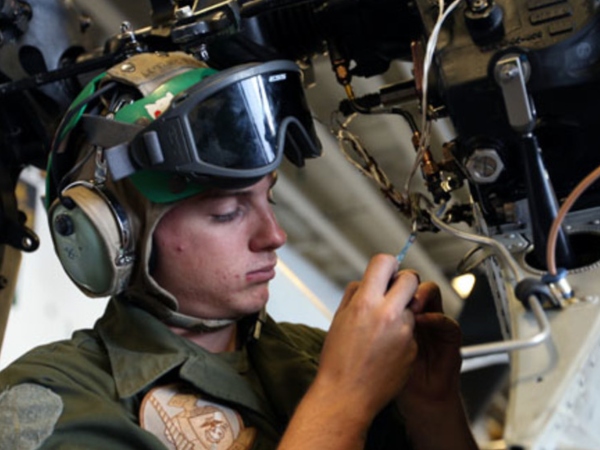
Marines that are interested in working aircraft communications, navigation, and radar systems need to qualify for the MOS through the ASVAB.
The Armed Services Aptitude Vocational Battery (ASVAB) is a series of tests used by the military to determine an eligible Military Occupational Specialty (MOS).
USMC 63 Field Aircraft Communications/Navigations/Radar Systems Technicians (MOS 6312-6313) must score a minimum of Electronics (EL): 105 or higher on the ASVAB.
Related Article – Marine Corps Reserve Benefits
Aircraft Communications/Navigation/Radar Systems Technician (MOS 6312)
Marine Corps Aircraft Communications/Navigation/Radar Systems Technicians (MOS 6312) are assigned to AV-8 aircraft.
The McDonnell Douglas AV-8 is a single-engine ground-attack aircraft used by the Marine Corps.
It is a second-generation Harrier jet capable of vertical and short takeoffs as well as landings.
Marine Corps Aircraft Communications/Navigation/Radar Systems Technicians (MOS 6312) install, remove, inspect, test, maintain, and make repairs on AV-8 aircraft.
Repairs are focused on systems, components, and ancillary equipment of installed Aircraft Communications/Navigation/Electrical/Radar Systems.
The equipment includes Deceptive Electronic Countermeasures (DECM) Systems at the OMA level.
Soldiers are required to gain confidential or secret security clearance from the Department of Defense.
Marines must also complete the Avionics Technician O Level Class in Florida.
Additional training takes place through the AV-8B Communication, Navigation, Identification, ECM Systems Organizational Maintenance Course (North Carolina).
Technicians must complete a sufficient period of on-the-job training (OJT) in order to qualify for MOS 6312.
Related Article – Air Force Radar, Airfield & Weather Systems (1C8X3): Career Profile
Aircraft Communications/Navigation/Radar Systems Technician (MOS 6313)
Marine Corps Aircraft Communications/Navigation/Radar Systems Technicians (MOS 6313) are like MOS 6312 technicians yet are assigned to EA-6 aircraft.
The Northrop Grumman EA-6 Prowler is a twin-engine, mid-wing electronic-warfare aircraft.
Marine Technicians (MOS 6313) are assigned to EA-6 Prowlers to install, remove, inspect, test, maintain, and repair avionics.
Aircraft Communications/Navigation/Radar Systems Technicians are delegated to systems, components, and ancillary equipment related to aircraft communications, navigation, electrical, and radar systems.
MOS 6313 Communications Technicians also work on Deceptive Electronic Countermeasures (DECM) Systems at the OMA level.
Aircraft Communications/Navigation/Radar Systems Technicians (MOS 6313) are required to have confidential or secret security clearance.
Technicians must complete the Avionics Technician O Level Class in Florida.
Additional training is offered through the EA-6B Communication, Navigation, Radar, ECM Systems Organization Maintenance Course in Washington.
A sufficient amount of on-the-job training is also mandatory for MOS 6313.
Related Article – Navy Electronics Technician (AT): Career Details
Avionics/Maintenance Technician UAS (MOS 6314)
Marine Corps Avionics/Maintenance Technicians UAS (MOS 6314) are assigned to unmanned aerial systems (UAS).
Unmanned aerial systems (UAS), more well known as drones, constitute aircraft which are not manned by a human pilot on board.
Avionics/Maintenance Technicians install, remove, test, inspect, maintain, and repair systems, components, and ancillary equipment related to unmanned aerial systems.
In order to remain eligible for Marine Corps Avionics/Maintenance Technician (MOS 6314) you must score Electronics (EL): 105 on the ASVAB.
Aircraft Avionics/Electrical Systems Technicians (MOS 6332-6337)
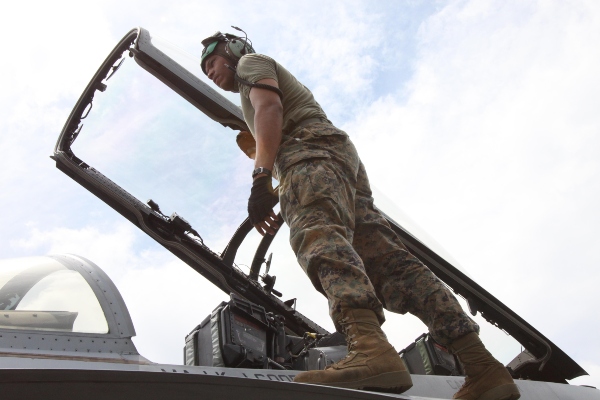
Marine Corps Aircraft Avionics and Electrical Systems Technicians focus more on electrical systems compared to the latter MOS 6312-6314.
Standard requirements of Avionics/Electrical Systems Technicians (MOS 6332-6337) mandate soldiers must be citizens of the United States and demonstrate normal color perception.
Additionally, a minimum ASVAB score of Electronics (EL): 105 or higher is required.
Related Article – USMC Field 61 (Aircraft Maintenance/Mechanic): Career Details
Aircraft Electrical Systems Technician (MOS 6332)
Marine Corps Aircraft Electrical Systems Technicians (MOS 6332) are assigned to the aforementioned McDonnell Douglas AV-8 aircraft.
A Marine Corps Aircraft Electrical Systems Technician (MOS 6332) installs, removes, inspects, tests, maintains, and repairs systems, components, and equipment related to Aircraft Electrical Systems.
The work is performed at the organizational maintenance activities (OMA) level.
Training begins at the Aviation Electricians Mate Course Class (Florida).
Aircraft Electrical Systems Technician (MOS 6333)
Marine Corps Aircraft Electrical Systems Technicians (MOS 6333) perform the same work yet on the Northrop Grumman EA-6 Prowler.
Technicians are once again tasked with installing, removing, inspecting, testing, and maintaining electrical systems and components.
A Marine Corps Aircraft Electrical Systems Technician (MOS 6333) is capable of making basic to intermediate repairs of aircraft electrical systems.
MOS 6333 is required to have confidential or secret security clearance from the Department of Defense.
Soldiers must complete the Aviation Electricians Mate Course Class like MOS 6332.
Additional training for the aircraft is handled by the EA-6B Initial Electrical and Instrument Systems Organizational Maintenance Course in Washington.
Related Article – Marine Corps Electrician (MOS 1141): Career Details
Aircraft Electrical Systems Technician (MOS 6336)
Marine Corps Aircraft Electrical Systems Technicians (MOS 6336) are assigned to KC-130 aircraft.
The Lockheed Martin KC-130 is a family of extended-range tanker transport aircraft.
The aircraft is commonly used for aerial refueling and a few other purposes.
A Marine Corps Aircraft Electrical Systems Technician (MOS 6336) is responsible for installing, removing, inspecting, maintaining, and repairing electrical systems and equipment related to KC-130 aircraft.
Training is offered through the Aviation Electricians Mate Course Class.
Additional training takes place with the KC-130 Electrical/Instrument Systems initial Organizational Maintenance Course in North Carolina.
Aircraft Electrical Systems Technician (MOS 6337)
Marine Corps Aircraft Electrical Systems Technicians (MOS 6337) are delegated work on F/A-18 aircraft.
The McDonnell Douglas F/A-18 Hornet is a twin-engine, supersonic jet that is important to the U.S. Navy and Marine Corps.
Aircraft Electrical Systems Technicians (MOS 6337) install, remove, inspect, test, maintain, and repair systems and equipment related to F/A-18 aircraft.
Soldiers need to complete the traditional Aviation Electricians Mate Course Class in Florida before advancing to specialized training.
The F/A-18 Electrical/Instrument Systems Initial Organizational Maintenance Course takes place in Virginia.
Related Article – Navy Electronics Technician (AT): Career Details
Aircraft Electronic Countermeasure Systems Technician (MOS 6386)
Marine Corps Aircraft Electronic Countermeasure Systems Technicians (MOS 6386) are delegated work related to the Northrop Grumman EA-6 Prowler.
An Aircraft Electronic Countermeasure Systems Technician (MOS 6386) installs, removes, inspects, tests, maintains, and repairs systems, components, and ancillary equipment related to EA-6B aircraft.
It includes operating and installing Aircraft Electronic Countermeasures Systems at the OMA level.
Marines need to score a minimum ASVAB score of Electronics (EL): 105.
Technicians must also receive confidential or secret security clearance from the military.
After completing the Avionics Technician O Level Class in Florida, soldiers progress to advanced training.
Marines must complete the EA-6B ECM Initial Organizational Maintenance Course in Washington.
Technicians must also complete a sufficient period of on-the-job training (OJT) before qualifying for MOS 6386.
Related Article – Air Force Electrical Systems (3E0X1): Career Details
USMC 63 Field (Avionics/Electrical Systems) – Pay
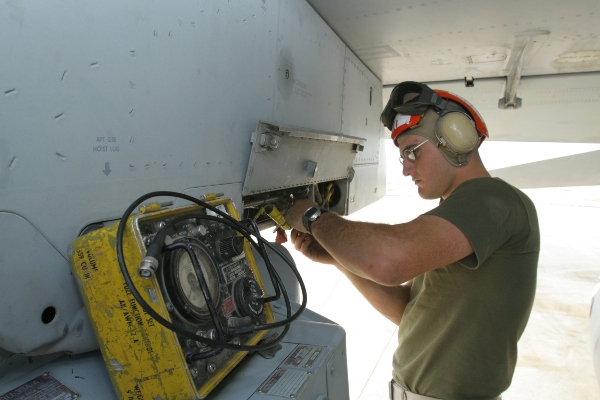
The Marine Corps pays its soldiers based on military rank and years of service.
Therefore, it doesn’t really matter the Military Occupational Specialty (MOS) in regard to determining pay.
How much can you expect to receive each month in the Marine Corps working USMC 63 Field?
The table gives an average monthly salary based on Marine rank:
| Insignia | Pay Grade | Rank | Abbreviation | 2023 Minimum Monthly Pay |
|---|---|---|---|---|
| E-1 +4 months | Private | Pvt | $1,917.60 | |
| E-2 | Private First Class | PFC | $2,149.20 | |
| E-3 | Lance Corporal | LCpl | $2,259.90 | |
| E-4 | Corporal | Cpl | $2,503.50 | |
| E-5 | Sergeant | Sgt | $2,730.30 | |
| E-6 | Staff Sergeant | SSgt | $2,980.50 | |
| E-7 | Gunnery Sergeant | GySgt | $3,3445.80 | |
| E-8 | Master Sergeant | MSgt | $4,957.20 | |
| E-8 | First Sergeant | 1stSgt | $4,957.20 | |
| E-9 | Master Gunnery Sergeant | MGySgt | $6,055.50 | |
| E-9 | Sergeant Major | SgtMaj | $6,055.50 | |
| E-9 | Sergeant Major Of The Marine Corps | SgtMaj | $6,055.50 |
Benefits
The U.S. Marine Corps offers a really good benefits package in addition to a salary:
- Medical Insurance
- Affordable Life Insurance
- Vacation Time
- Special Pay
- Retirement
- Education: Marines can earn full-tuition, merit-based scholarships, allowances for books and fees, plus annual stipend for living expenses.
- Housing: Allowances for living expenses, utilities, and maintenance.
- Food: Allowance for the on-base dining hall and access to tax-free department and grocery stores.
Related Article: 7 Benefits Of Joining The Marine Corps
Job Reviews
There are very few job reviews available online that are specific to military careers in USMC 63 Field.

However, Indeed.com and GlassDoor.com have a wide selection of reviews (good and bad) related to the experience of serving in the Marine Corps.
Both websites are dependable sources for accurate reviewers since job posters must confirm they previous worked for the company/organization.
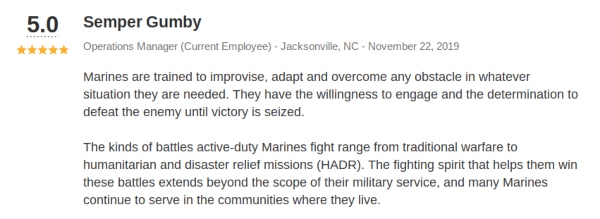
Speaking with a Marine recruiter can also help address any questions or concerns you have about serving in the military.
Marine recruiters can help you prepare for the Armed Services Vocational Aptitude Battery (ASVAB) and qualify for jobs in USMC 63 Field.

Related Article – USMC Field 62 (Aircraft Maintenance/Mechanic): Career Details
Civilian Job Opportunities
The vast majority of the work performed by Marines in USMC 63 Field is specific to the military.
Regardless, there are plenty of opportunities for career advancement in the civilian world after completing your service in the Marine Corps.
USMC 63 Field military jobs teach you highly sophisticated and complex duties related to avionics and electrical systems.
Therefore, avionics technicians are still needed for commercial airliners and other industries related to transportation.
The skills you acquire can also lead to a number of different opportunities related to electronics.
Summary
USMC 63 Field Avoinics/Electrical Systems is one of many occupational fields related to aviation.
The duties performed by USMC 63 Field helps make Marine aircraft stable and reliable.
Pilots and other flight crew members depend on the work of Marine OccFld 63 in order to remain safe and secure in the air.
Related Article: 10 Best Marine Corps Jobs For Civilian Life
Resources:
- https://www.marines.mil/Portals/1/Publications/MCO%20P4790.20.pdf
- https://www.cool.navy.mil/usn/overview/index.htm
- https://www.mosdb.com/marine-corps/
- 5 Best Jobs for Female Marines - June 20, 2024
- 10 Best Marine Corps Recruiting Videos of All Time - June 20, 2024
- Marine Corps Requirements - June 20, 2024

